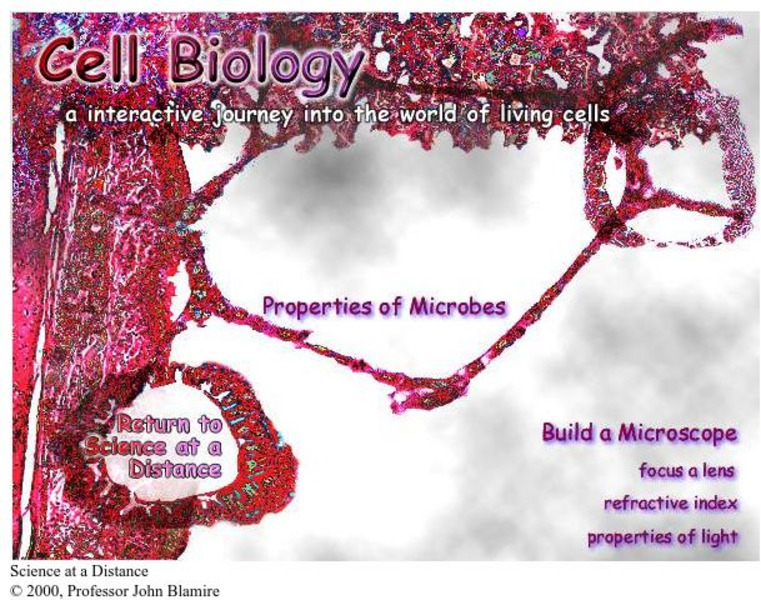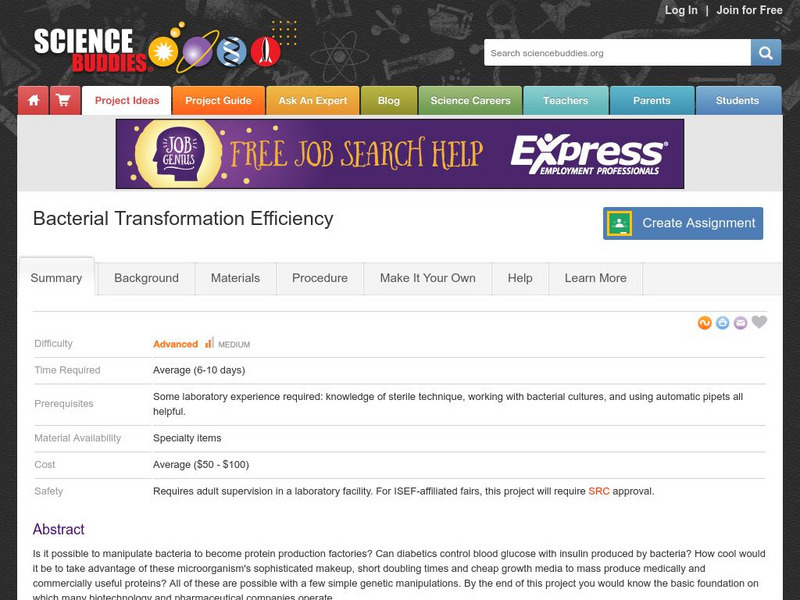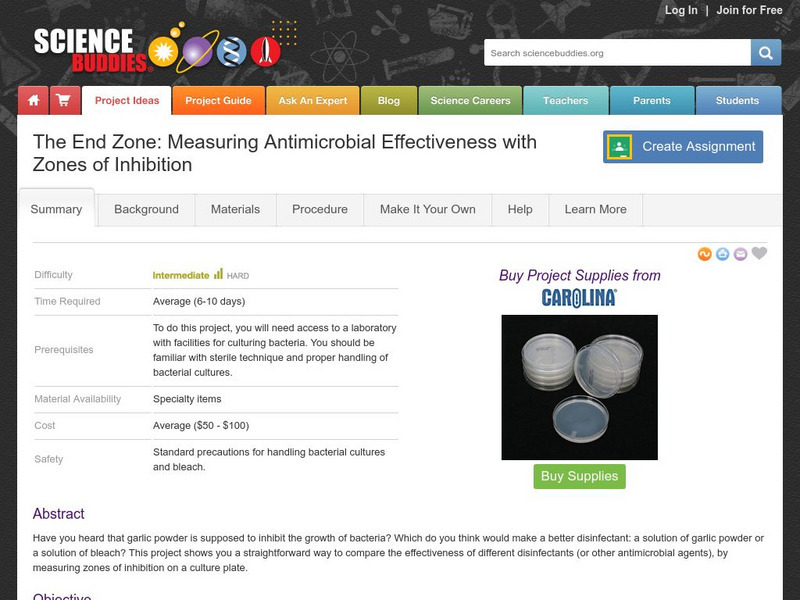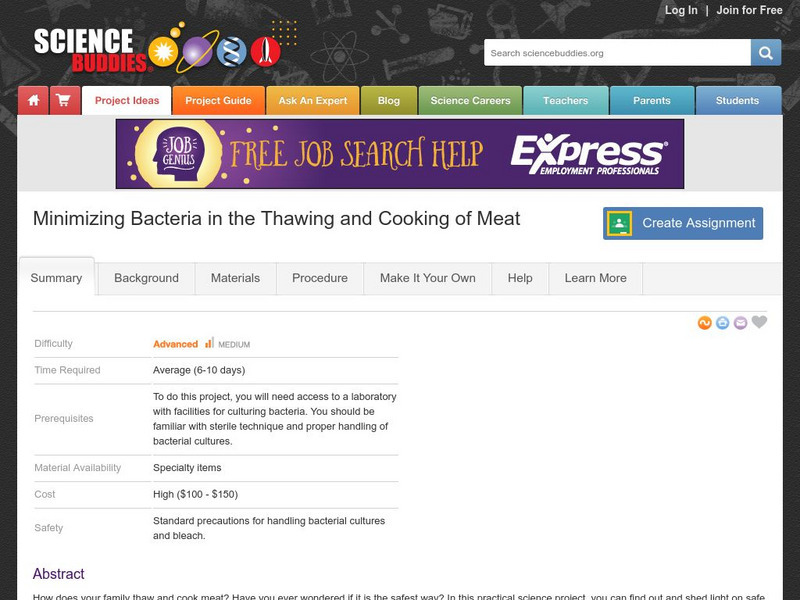Hi, what do you want to do?
Curated OER
E.coli and their Human Environment
Learners observe how environmental changes (antibiotics) can affect the growth of E.coli, the rod shaped intestinal bacterium. They use the "F" test for statistical analysis. Students
Curated OER
The City From the Ooze
Students investigate the life in the mud found around ponds. They create Ooze City using pond mud. Students investigate the various layers that form and what type of organisms are in the mud.
Curated OER
How Clean are the Laboratory Tables?
Students participate in an experiment in which they test the cleanliness of the lab tables. They practice using different materials and analyze their results. They answer comprehension questions to end the lesson.
Curated OER
Disease
Students study the differences between viruses and bacteria. They educate others to the harms and benefits of each by making a newspaper ad, pamphlet or informative article.
Curated OER
Cavern Life: The Food Web
Students explain the importance of elements on a food web. They realize that without light there can be no life. They perform various activities based on grade level.
Curated OER
Palm Use in Biology
Students view bacteria through a microscope. They draw and label the bacteria using microbiology software loaded onto their Palms.
Curated OER
Can Bacteria Arise from Non-living Things?
Fourth graders, in groups, determine whether bacteria arises from non-living things,
Curated OER
Micro-organisms
Students examine how micro-organisms are living organisms that are often too small to be seen. They explain that micro-organisms may be beneficial or harmful.
Curated OER
Cleanliness
Students identify ways that staying clean contribute to good health. They perform an experiment involving potatoes and washed and unwashed hands, observing the results. They complete a cleanliness chart, checking off each healthful habit...
Biology Pages
Kimball's Biology Pages: Antibacterial Agents
This site lists the different antibiotics, tells how they disrupt the life cycle of the bacteria, and give examples of where in nature the antibiotic is from- i.e., penicillin -> bread mold.
BBC
Bbc News: What Is Anthrax?
Find out about the deadly bacterial disease Anthrax, and understand the symptoms and how it can be treated.
City University of New York
Cell Biology: An Interactive Journey
This interactive website about microscopes and microbes provides students with an introduction to cellular biology.
City University of New York
Brooklyn College: Direct Microscopic Counts
Guidelines for an activity through which you, acting as a research assistant for a wine merchant, work to grow a microbe under different conditions.
Michigan State University
Michigan State University: Digital Learning Center for Microbial Ecology: Microbe Zoo
Explore the "many worlds of hidden microbes" in different areas of the Microbe Zoo: DirtLand, Animal Pavilion, Snack Bar, Space Adventure, and WaterWorld. A fun and informative resource that sheds light on the role of microbes in our...
University of California
Ucmp: Cyanobacteria
General information on the cyanobacteria, the blue-green algae and the features that make them different from prokaryotic bacteria. Also included are pages that point to more specific info, like life history and fossil records.
University of California
Ucmp: Introduction to the Archaea
Berkley offers an introduction to archaebacteria--ancient bacteria--including the history of the topic, scientific findings, and where to find archaeans. Includes images and links.
Science Buddies
Science Buddies: Career Profile: Microbiologist
Microbiologists spend their careers peering through microscopes in their study of microorganisms. They have plenty to look at since these are Earth's most common life-forms. Science Buddies outlines the education requirements as well as...
Science Buddies
Science Buddies: Project Ideas: Is the Gold in My Jewelry Real?
In this science fair project, determine if the oligodynamic effect of gold on bacteria is strong enough to differentiate between jewelry of different karats. The Science Buddies project ideas are set up consistently beginning with an...
Science Buddies
Science Buddies: Germ Invasion
Microbes are everywhere in our environment, but for the most part they escape our notice. This project shows you how to safely culture and study common bacteria from your everyday surroundings.
Science Buddies
Science Buddies: Bacterial Transformation Efficiency
Is it possible to take advantage of microorganism's sophisticated makeup, short doubling times and cheap growth media to mass produce medically and commercially useful proteins? This is possible with a few simple genetic manipulations....
Science Buddies
Science Buddies: Yogurt Cultures
Find out in this experiment how good bacteria can turn milk into a treat by investigating the optimal starter cultures for making yogurt from whole milk.
Science Buddies
Science Buddies: The End Zone: Measuring Antimicrobial Effectiveness
Antimicrobial agents are chemicals that are used against bacteria. There are many such agents available. Because there are many different situations where bacterial control is important, no antimicrobial agent is effective in all...
Science Buddies
Science Buddies: Minimizing Bacteria in the Thawing and Cooking of Meat
Here's a practical project that sheds light on safe practices in the kitchen. Use this information to determine which method of defrosting meat is safest and which method of cooking kills the most bacteria.
Science Buddies
Science Buddies: What Duration of Ultraviolet Exposure Kills Bacteria?
Ultraviolet light can damage DNA molecules. If a cell's DNA repair mechanisms can't keep up with the damage, mutations are the result. As harmful mutations accumulate, the cell eventually dies. How much ultraviolet light is too much for...




























